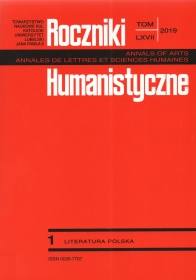Karol Kurpiński’s Zamek na Czorsztynie – Romanticism in statu nascendi?
Abstract
Karol Kurpiński’s operatic works played a unique role in the process of shaping new trends in Polish opera theatre and in theatrico-musical criticism at the border of Enlightenment and Romanticism. The article presents press discussions devoted to the operas of the author of Zamek na Czorsztynie [The Czorsztyn Castle] in the 1920s, i.e. at the time of their first stagings in the National Theatre in Warsaw. Numerous controversies and contradictions that appear in the 19th-century reviews of Kurpiński’s operas testify to how difficult it was for his contemporary critics to explicitly classify and evaluate these works. A thorough review of the press at that time also shows that the dramatic and musical works by the author of Pałac Lucypera [Lucyper’s Palace], as great examples of the genological complexity of opera forms at that time and an important element of the process of formation of the so-called national opera programme, constituted an excellent starting point for discussions between the two opposition socio-cultural camps formed in Warsaw in the last years of the 1920s, which represented different aesthetic ideals and understood the tasks and functions of theatre criticism in two different ways. However, as it turns out, the statements of the representatives of the antagonistic camps about Kurpiński’s works did not follow a single, simple scheme – on the contrary, the controversies between the Classicist critics and their opponents were arranged in a very complicated and heterogeneous pattern. This multi-faceted reflection of the 19th-century critics on his works perfectly illustrates the fluidity and fuzziness of tendencies regarded in the research tradition as contradictory, i.e. the “Classical” and “Romantic” tendencies, which leads to the verification of some judgments about the composer and the reception of his output formulated in the contemporary works of music, theatre and literary historians.
References
Bruchnalski Wilhelm, Mickiewicz – Niemcewicz. Studium historyczno-literackie, Lwów 1907.
Gmys Marcin, Karol Kurpiński i romantyczna Europa, Warszawa 2015.
Kowalczykowa Alina, Widzenie w biały dzień. O „Romantyczności” Mickiewicza, „Pamiętnik Literacki” 1975, z. 3.
Lisowska Agnieszka, Karol Kurpiński jako pisarz, działacz i organizator muzyczny, [w:] Szkice o kulturze muzycznej, t. II, red. Zofia Chechlińska, Warszawa 1973.
Nowak-Romanowicz Alina, Niektóre problemy opery polskiej między oświeceniem a romantyzmem, [w:] Studia Hieronymo Feicht septuagenano dedicate, red. Zofia Lissa, Kraków 1965.
Nowicka Elżbieta, Opera w Polsce na początku XIX wieku – wyobrażenia, poglądy, teorie, [w:] Teorie opery, red. M. Jabłoński, Poznań 2004.
Nowicka Elżbieta, „Słownik zaklętych słów do muzyki”. O librettach „oper narodowych” J. Elsnera i K. Kurpińskiego, [w:] taż, Omamienie – cudowność – afekt. Dramat w kręgu dziewiętnastowiecznych wyobrażeń i pojęć, Poznań 2003.
Papierzowa Anna, Libretta oper polskich z lat 1800-1830, Kraków 1959.
Płońska Katarzyna, Wstęp [do:] taż, Katalog tematyczny oper Karola Kurpińskiego, Warszawa 2015.
Przybylski Ryszard, Romantyzm jako przepaść klasyka, [w:] tenże, Klasycyzm, czyli prawdziwy koniec Królestwa Polskiego, Gdańsk 1996.
Przybylski Tadeusz, Karol Kurpiński, Warszawa 1980.
Przychodniak Zbigniew, U progu romantyzmu. Przemiany warszawskiej krytyki teatralnej w latach 1815-1825, Wrocław 1991.
Pusz Wiesław, „Nowy Parnas” przedromantycznej Warszawy. Bruno Kiciński i grono jego współpracowników, Wrocław 1979.
Recenzje teatralne Towarzystwa Iksów 1815-1819, oprac. Jacek Lipiński, Wrocław 1956.
Strumiłło Tadeusz, Nowak-Romanowiczowa Alina, Kuryłowicz Teresa, Poglądy na muzykę kompozytorów polskich doby przedchopinowskiej. Ogiński – Elsner – Kurpiński, Kraków 1960.
Witkowski Michał, Świat teatralny młodego Mickiewicza, Warszawa 1971.
Zgorzelski Czesław, Duma poprzedniczka ballady, Toruń 1949.
Żmigrodzka Maria, „Ballady i romanse” wobec tradycji niemcewiczowskiej, „Pamiętnik Literacki” 1956, zeszyt specjalny.
Copyright (c) 2019 Roczniki Humanistyczne

This work is licensed under a Creative Commons Attribution-NonCommercial-NoDerivatives 4.0 International License.





